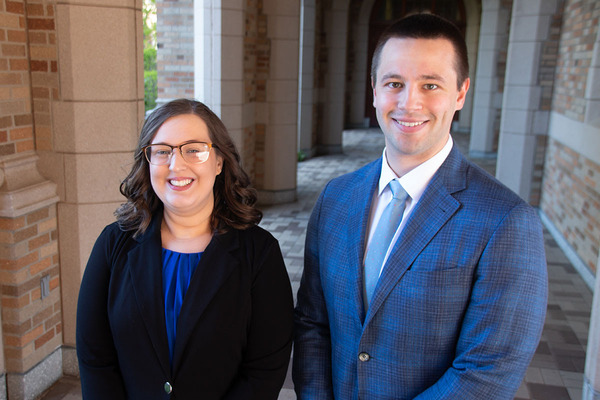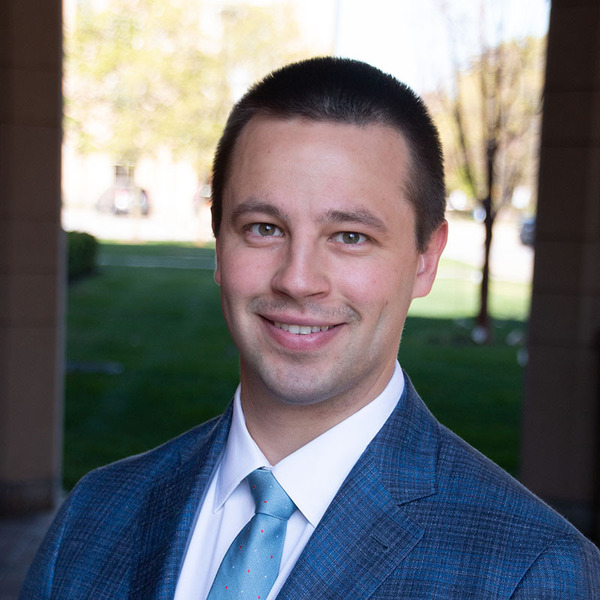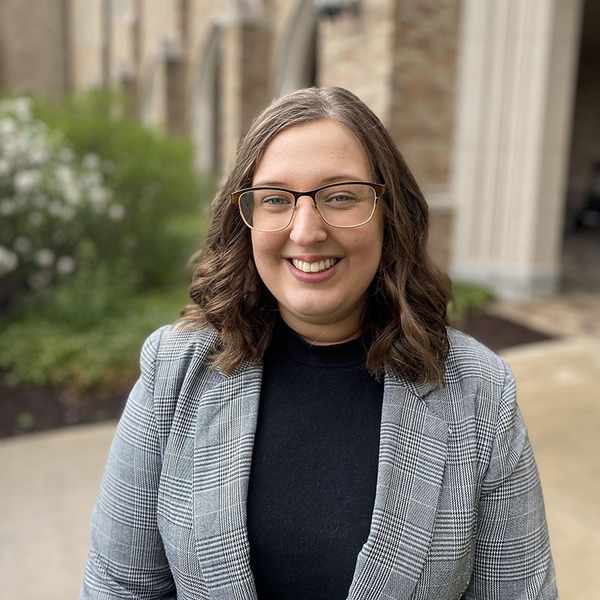ND Law’s 2023 Shaffer Fellows to address housing issues, provide expungement relief in Chicago and rural Kentucky

Thomas Haracz and Jeanna James, both members of Notre Dame Law School’s Class of 2023, have been awarded Thomas L. Shaffer Public Interest Fellowships. During their fellowships, Haracz and James will address housing and eviction issues for low-income clients and criminal expungement relief.
The Shaffer Fellowship, named in honor of former dean and professor Thomas L. Shaffer and funded by donor support, is awarded each year to two members of Notre Dame Law School’s graduating class. The fellows’ salaries and benefits are covered while they work for two years at a nonprofit organization providing legal services to low-income or other underrepresented populations. Fellowship recipients develop their own jobs and projects that directly meet an unmet or underrepresented legal need.
Thomas Haracz
Legal Aid Chicago
Haracz’s fellowship with Legal Aid Chicago will enable him to serve a group of clients whose housing-related legal issues are not currently being met.
With their current model, Legal Aid Chicago is not able to assist some low-income clients in the federal Housing Choice Voucher program. Haracz will work in Legal Aid Chicago’s Housing Practice Group to represent these clients who are being evicted and losing their housing subsidy.
“My position will be to represent these clients to stop these evictions and work with certain agencies to prevent these types of evictions from even being filed in the first place,” he said.

Haracz came to Notre Dame Law School with the intention of pursuing a career in public interest, particularly in housing. He became interested in housing issues when he served with the Jesuit Volunteer Corps after graduating from the College of the Holy Cross. His placement was in the housing department at an emergency services center in Syracuse, N.Y. He said it was the first time he was intimately exposed to many of the issues surrounding housing and eviction, and he greatly enjoyed the work. He then spent a year before law school working with the Housing Practice Group at Legal Aid Chicago.
“This work is something I have become quite passionate about in the last five years. I feel it has an impact on the community. Access to housing and housing stability are some of the most important of our basic human needs,” said Haracz. “This fellowship gives me the opportunity to work to improve housing stability to a client base that has unfortunately been overlooked in recent years.”
During his first-year summer, Haracz worked at the Lawyers’ Committee for Better Housing in Chicago. During his second-year summer, he worked at Cabrini Green Legal Aid, also in Chicago, representing clients petitioning to have their criminal records sealed or expunged.
At Notre Dame Law School, he participated in one of the Public Interest Externships at Indiana Legal Services and was involved with the Law School’s Eviction Clinic.
“I know that a two-year position is not long enough to address and fix every issue with subsidized housing in Chicago,” said Haracz. “My hope is that through this fellowship I am able to make even the smallest difference to subsections of the community that have previously not had someone to fight for them.”
Jeanna James
Legal Aid of the Bluegrass
James’ fellowship will bring her back home to Kentucky to work with Legal Aid of the Bluegrass in Lexington.
James is a first-generation professional student who grew up in a working-class family in rural Kentucky. She said her fellowship will target two of the biggest needs in the Lexington area: helping low-income clients in landlord-tenant cases, and helping clients attain relief from their criminal records. She will also be involved in a new eviction mediation program and a collaborative project with the city-county government to disburse rental assistance funds.
“An eviction or criminal record can be devastating for people seeking to make financial gains toward more stable and safe housing,” said James. “A criminal record disqualifies those reentering the community from affordable housing, employment, and higher education opportunities — all of which are vital to prevent recidivism. Those with a criminal record are often barred from public housing and cannot afford or are discriminated against in private housing.”

James was inspired to pursue public interest work at a young age when she saw her parents become advocates for her sister and friends who started a club to support LGBT students at the local high school. Her father would sit outside the club’s meetings to make sure no one carried out the threats that were being made toward the club. Her mother attended school board meetings and took the issue to the ACLU of Kentucky to pressure the school administrators to ensure the students’ safety and allow the club to continue.
“I learned, by watching my parents and sister, the importance of standing up for those who cannot stand up for themselves, and I saw lawyers help both the marginalized and average people like my family,” said James. “It was my lightbulb moment where I knew I wanted to do the same thing.”
At Notre Dame Law School, James got hands-on legal experience through several of the Law School’s clinics and externship programs. She did Public Interest Externships at the Northern District of Illinois and with Federal Community Defenders in South Bend. She worked with the Eviction Clinic during the spring of her second year, full time during her second-year summer, and throughout her third year.
James served as a research assistant to Clinical Professor Emerita of Law Judith Fox. She also did a directed reading with Fox on the impact of stable housing on recidivism rates. This was part of the inspiration for her fellowship project.
She has also served on the Law School’s Public Interest Leadership Council and has been active in the Notre Dame chapters of the American Constitution Society and National Lawyers Guild, where she served as co-president.
Returning to her home state for her fellowship means a lot to James.
“As a ninth-generation Kentuckian and as someone who was fortunate enough to obtain a quality college and legal education, I feel a responsibility to help break our cycles of poverty and incarceration,” she said. “I am so excited to start off my legal career with Legal Aid Bluegrass and to grow as an advocate.”
Established in 2013, the Thomas L. Shaffer Public Interest Fellowship continues a long tradition of public interest at Notre Dame Law School. The fellowship honors Thomas L. Shaffer ’61 J.D., who was a longtime faculty member and former dean at Notre Dame Law School. During his tenure, he was a supervising attorney in the Notre Dame Legal Aid Clinic, now called the Notre Dame Clinical Law Center, where he taught clinical ethics and guided the legal practice of law students who served underprivileged people in the South Bend area.